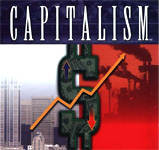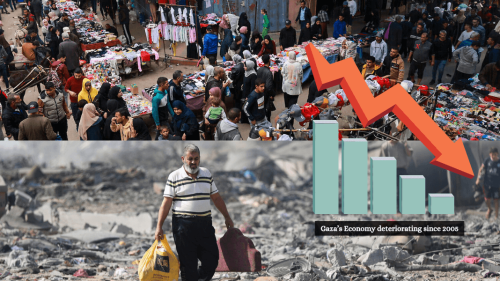Capitalism - From the Standpoint of Its Victims
 |
It has never been easy offering a critique of capitalism or markets to my undergraduate students. Most have never heard an unkind word about these bedrock institutions, which they know to be the foundations of American power and prosperity.
These are hallowed institutions. The power of private capital to produce jobs, wealth and freedom is one of the central dogmas that many Americans absorb with their mother's milk. To hear this dogma challenged - in any context - is unsettling. I sometimes suspect that this bitter pill is harder to swallow because it emanates from someone who, so transparently, is not a native-born American.
As the weeks pass, however, my students appear to settle down. In the past, they have been reassured to learn that markets have done a good job at delivering prosperity to a few centers of global capitalism. They do work for us, even if they have not worked for most Asians, Africans and Latin Americans.
Nevertheless, the thesis that 'free' markets have rarely worked for economies lagging far behind the economic leaders, does not quite take root. The fault could not lie with markets. For too long, the West has believed that Asians, Africans and Latin Americans failed because they were lazy, spendthrift, venal and unimaginative.
My students - like most Americans - have been conditioned to look at capitalism from the standpoint of the winners in global capitalism. Because of the accident of birth, they have been the beneficiaries of the wealth and power that global capitalism concentrates at the nodes of the system. They cannot conceive how a system that has worked so well for them could produce misery for others in Asia, Africa and Latin America.
I have been away from my teaching duties as the United States has led the world into a deepening recession. Within a few months, the titans of Wall Street have been laid low, res-cued from extinction by tax-financed bailouts. Teetering on the edge of bankruptcy, the auto giants have been placed on life-support also by taxpayers, their future still uncertain. In this maelstrom, there steps forward Bernard L. Madoff, the Einstein of Ponzi schemes, who operated his colossal con for twenty years without notice from regulators.
Millions of Americans have lost their jobs; millions are threatened with loss of their homes; millions have seen their retirement funds melt before their eyes; millions are threatened with loss of health care. As Americans on Main Street were being devastated, executives of bailed out banks continued to receive millions in bonuses. That straw now threatens to break the back of the fabled American tolerance for the foibles of the capitalist system.
Ordinarily, American democracy directs its venom against writers and activists on the left, foolish enough to want to de-fend the underprivileged. For a change, Americans are threatening captains of finance, venerable bankers, with dire consequences - even death threats.
I was on sabbatical when Al-Qaida brought down the Twin Towers on September 11. Then, I was relieved to be away from my students, afraid that some of them might want to lump me with those who had perpetrated these attacks.
I am on sabbatical, again, as the towers on Wall Street were being toppled by greed, recklessness and fraud; by a free-market ideology that has no regard for human life; by capitalist elites and their partners in the White House and Congress, who had turned the financial sector into a giant Ponzi scheme.
Americans have been subjected to acts of 'terrorism' whose final human toll will make September 11 look like a tea party. The perpetrators of this terror are all homegrown; they were trained not in the mountains of Afghanistan but at Harvard, Yale and Stanford; the bankers, executives and legislators who preyed on Americans are the crme de la crme of American society.
When I return to teach in Fall of this year, I expect to meet students chastened by their experience. Nothing undermines capitalist ideologies faster and more effectively than capitalist crises. No critique of capitalism can be more penetrating than the depredations of unemployment, immiseration, homelessness that it inflicts on its victims. So recently victimized - at the very center of global capitalism - perhaps, Americans might learn to empathize with victims elsewhere - in Africa, Asia and Latin America - who have been ravaged by this system for centuries.
Capitalist ideologues will be working overtime to deflect American anger away from the system to a few villains, to a few rotten apples. Congressional hearings will identify scapegoats; they will hang a few 'witches.' A few capitalist barons will be sacrificed. As public anger subsides, attempts will be made to shift the blame to feckless homebuyers and compulsive consumers. At all costs, the system must be saved. The capitalist show must go on, with as little change as possible.
Quite apart from this crisis, however, new technologies, in combination with the irreversible shift of sovereignty to some segments of the capitalist periphery, have been changing the dynamics of unequal development. The high-wage workers - the so-called middle classes in the developed countries - have been losing the protection they have long enjoyed against com-petition from low-wage workers in China and India.
More and more global capitalism will enrich some workers in the 'periphery' at the cost of workers in the 'centers' of capitalism. In the years ahead, the great alliance that was forged between capitalists and workers in the centers of capitalism will come under greater strain. More and more, the interests of these two classes will diverge.
Powerful corporations will still insist on openness, while growing ranks of workers will press for protectionism. This revival of class conflict in the old capitalist centers will strain existing political arrangements. After a co-optation that has lasted for more than a century, the demos will begin to threaten the corporate elites. New demands will be placed on intellectual mercenaries in the media and academia to use new, more effective tools to dumb down the demos.
As growing segments of high-wage workers in the rich countries become the new victims of capitalism, will they slowly learn to see capitalism from the standpoint of its victims? In this new emerging reality, will orthodox economics migrate from its old centers in London, Cambridge and Chicago to new centers in Bangalore and Beijing?
A curious world this will be when seen from the old centers. In truth, this will only be a long-delayed correction to two centuries of unequal development, dominated by Western centers. Sadly, the correction will not go far enough: it will leave much of the world mired in poverty and disease.
M. Shahid Alam is professor of economics at Northeastern University. This essay is excerpted from his forthcoming book, Israeli Exceptional-ism: The Destabilizing Logic of Zionism (Palgrave Macmillan: November 2009). He is author of Challenging the New Orientalism (IPI: 2007). Send comments to [email protected]. Visit the author's website at http://aslama.org .
Topics: Criticism Of Capitalism, Economy, Globalization, Latin America
Views: 2995
Related Suggestions

















